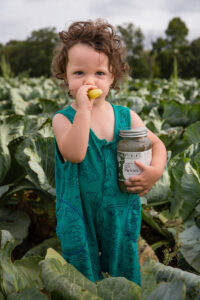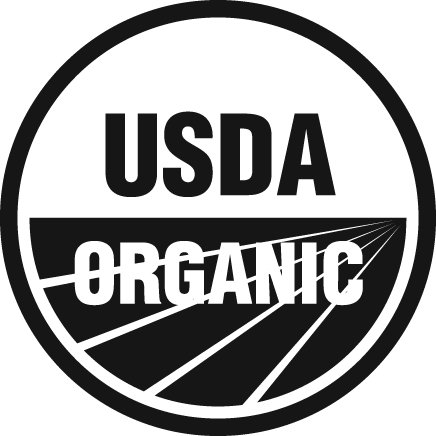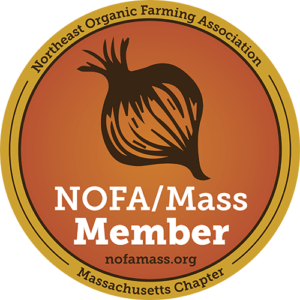
Raw, fermented vegetables are enjoying both a cultural and scientific renaissance in recent years. While more people are appreciating the flavors and versatility, many studies are showing that including these foods in our diet can improve our health from gut to brain.
Healthy gut, healthy bodies
Research demonstrates that the health and diversity of our gut microbiota contributes to our overall well-being. Our intestinal “microbiome” is heavily populated, hosting more microbial cells than there are human cells in our entire body. And it is incredibly diverse, with 100 times more DNA than the entire human genome! (Shanahan, 2002) This complex community influences our health in many ways and is highly impacted by our diet. Fermented foods that are raw and nutrient-rich are an important part of a diet that nourishes this microbial community, and in turn, our own general health (Marco et al., 2017; Moise, 2017).
A wild and living food… starting with healthy soil
Living microbes are responsible for the lactic acid fermentation of vegetables. The fermenting microbes in Real Pickles products come on organic vegetables from farms that prioritize healthy, living soil (Einson et al., 2018). During a “wild” or “spontaneous” lactic acid fermentation (no cultures added), these live microbes break down the raw vegetables into a food that is rich in important nutrients including proteins, fats, fiber, minerals, vitamins and carbohydrates (Penas et al., 2017). These nutrients are an important part of a balanced diet, and when consumed through food are delivered in appropriate amounts.
Biologically active and nutrient-rich
The health and diversity of our gut microbiome influences our overall health in many ways, including immune system function, intestinal tract health, metabolism, and brain health (Moise, 2017). Fermented foods, including lactic acid fermented vegetables, can positively impact gut health by transforming food constituents into health-promoting compounds that improve digestibility, nutrient synthesis and availability, and production of biologically active compounds that promote good bodily health (Marco et al., 2017; Fideler et al., 2019; Wastyk et al., 2021). Lactic acid fermentation produces a wide diversity of antioxidants and nutrients, such as folates, which are important for fetal development and blood cell production (Jägerstad, et al., 2004); oligosaccharides, which are associated with anticancer activity (Zielinski et al, 2017); and bioactive peptides, which are known to support immune and circulatory system function (Fideler et al., 2019). Evidence shows that fermented foods produce antioxidants and anti-tumor compounds that may reduce the risk of some cancers (Penas et al., 2017; Lai et al., 2014; Ismail et al., 2013). Lactic acid fermentation also degrades anti-nutrients, such as phytates and polyphenols, which decrease mineral bioavailability and nutrient absorption (Drosinos et al., 2012; Preiss et al., 2002; Hunaefi et al., 2013; Zielinski et al, 2017). For example, in fermented foods lactic acid bacteria are known to produce D-phenyllactic acid (D-PLA), which promotes a physiological immune response in humans (Peters et al., 2019) and gamma-amino butyric acid (GABA), which is known to reduce anxiety and blood pressure, improve decision-making, and boost immunity (Fideler Moore et al., 2021).
Fast gene evolution and adaptation
The gut microbiome acts as a “hot spot” for horizontal gene transfer between microbes, including those from fermented foods. This increases the potential for adaptability of our intestinal health to both external and internal stressors (Kurokawa et al., 2007).
Exercise tonic
Studies suggest an association between beet juice nitrate and reduced blood pressure (Asgary et al., 2016). Pickle brine has been shown to reduce muscle cramping (Siervo et al., 2012; Miller et al., 2010).
SOURCES:
- Asgary S et al., 2016. Improvement of hypertension, endothelial function and systemic inflammation following short-term supplementation with red beet (Beta vulgaris L.) juice: a randomized crossover pilot study. J Hum Hypertens 30(10):627-32. doi: 10.1038/jhh.2016.34.
- Aslam et al., 2020. Fermented foods, the gut and mental health: a mechanistic overview with implications for depression and anxiety. Nutritional Neuroscience 23 (9) 659-671.
- Drosinos, E.H. et al., 2012. Nutritional attributes of lactic acid fermented fruits and vegetables. Agro Food Industry Hi-Tech 23 (5) 46-48.
- Einson, J.E. et al., 2018. A Vegetable Fermentation Facility Hosts Distinct Microbiomes Reflecting the Production Environment. Applied and Environmental Microbiology, 84 (22).
- Fideler, J et al., 2019. Discovery and quantification of bioactive peptides in fermented cucumber by direct analysis IR-MALDESI mass spectrometry and LC-QQQ-MS. Food Chemistry, 271 (2019) 715-723.
- Fideler Moore, J et al., 2021. Formation of γ-aminobutyric acid (GABA) during the natural lactic acid fermentation of cucumber. Journal of Food Composition and Analysis, 96 (2021) 103711.
- Hunaefi, D et al., 2013. Effect of fermentation on antioxidant properties of red cabbages. Food Biotechnology, 27(1), 66-85.
- Ismail et al., 2013. Exposition of antitumour activity of a chemically characterized exopolysaccharide from a probiotic Lactobacillus plantarum MTCC 9510. Biologia: Section Cellular and molecular Biology 68 (6), 1041-1047.
- Jägerstad et al., 2004. Folates in fermented vegetables – a pilot study. LWT-Food Science and Technology 37(6), 603-611.
- Kurokawa, K et al., 2007. Comparative metagenomics revealed commonly enriched gene sets in human gut microbiomes. DNA Research 14 (4), 169-181.
- Lai et al., 2014. Isolation of exopolysaccharide producing Lactobacillus strains from sorghum distillery residues pickled cabbage and their antioxidant properties. Food Science and Biotechnology 23(4), 1231-1236.
- Marco, M. L. et al., 2017. Health benefits of fermented foods: microbiota and beyond. Curr. Opin. Biotechnol. 44, 94–102. doi: 10.1016/j.copbio.2016.11.010
- Miller, K et al., 2010. Reflex Inhibition of Electrically Induced Muscle Cramps in Hypohydrated Humans. Medicine & Science in Sports & Exercise. 42 (5), 953-961.
- Moise, Ana Maria. The Gut Microbiome: Exploring the Connection between Microbes, Diet, and Health. Greenwood Publishing Group, 2017
- Penas et al., 2017. Sauerkraut: Production, Composition, and Health Benefits. In: Fermented Foods in Health and Disease Prevention. Ed: Frias et al. Elsevier Inc., 557-576.
- Preiss, U et al., 2002. Effect of fermentation on components of vegetable. Deutsche Lebensmittel-Rundschau 98 (11), 400-405.
- Quilez, J and M Diana, 2017. Gamma-Aminobutyric Acid-Enriched Fermented Foods. Ed: Frias et al. Elsevier Inc., 85-103.
- Shanahan, F., 2002. The host-microbe interface within the gut. Best Practice & Research in Clinical Gastroenterology, 16 (6), 915-931. DOI: 10.1053/bega.2002.0342
- Siervo, M et al., 2012. Inorganic Nitrate and Beetroot Juice Supplementation Reduces Blood Pressure in Adults: A Systematic Review and Meta-Analysis. Journal of Nutrition and Disease 143 (6), 818-826.
- Wastyk, H et al., 2021. Gut-microbiota-targeted diets modulate human immune status. Cell 184, 1-17.
- Zielinski et al, 2017. The Naturally Fermented Sour Pickled Cucumbers. In: Fermented Foods in Health and Disease Prevention. Ed: Frias et al. Elsevier Inc.
These statements have not been evaluated by the Food and Drug Administration. Real Pickles products are not intended to treat, cure, or prevent any disease.




